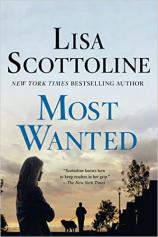Reading Group Guide
Discussion Questions
Most Wanted

1. The struggle to have a child can strain a marriage. What is your overall impression of Christine and Marcus’s marriage? How did it evolve over the course of the book? Do you think they would have had problems in their marriage even if they did not have to deal with infertility? If so, why?
2. A large percentage of couples face fertility problems for a variety of issues, and turn to modern medicine in order to have a child. Was there anything that you learned about the process that surprised you? Had you ever heard of Marcus’s condition? What are your feelings about the entire process? Some view helping infertile couples conceive as “playing God.” Do you agree or not? Do you think this is generational? Faced with Christine and Marcus’s situation, what option do you think you would have chosen?
3. Through Lisa’s research for MOST WANTED, she discovered that although there is extensive testing of egg donors, including psychological evaluations, the same was not true of sperm donors. Why do you think the standard practices and regulations are so lopsided? Do you think this is reflective of the double standard between men and women? What responsibility do you think the sperm banks should have to their customers? How much follow-up do you think they should be required to do with their donors? Do they owe it to their customers to report concerns, after the fact? Isn’t it also true that there are costs associated with such monitoring? And do you think infertile women and men view their medical condition differently?
4. Couples may be so understandably vulnerable by the time they rely on medical intervention to have a baby. Do you think the industry is regulated enough to protect these people from unscrupulous business practices? What should people do to protect themselves? With the legalization of same-sex marriage, the use of sperm and egg donors is sure to increase. Do you think the industry is prepared for the increase in demand?
5. What rights do you think the child has in this situation? Interestingly, the U.S. allows anonymous sperm donations, but the United Kingdom requires disclosure to the offspring. What do you think about that difference? Although the donor provides a detailed history, do you think that is enough information for the child? Would you want to meet your donor parent? If you used a donor, how would you feel about your child meeting the donor? At what age, if ever, would you tell your child? Some experts Lisa consulted said six years or even younger it’s the time to tell the child. Agree or disagree?
6. What do you think about nature vs. nurture? Do you think that a tendency toward violence is inherited through DNA, or created by the environment to which a person is exposed? What are your thoughts about the warrior gene? Do you think it is a real genetic indicator? With the amount of violence in today’s society, do you think children should be tested for it? If yes, under what circumstances, if no, why not? What would be the benefits of this and what would be the downside?
7. The competitive tension between Marcus and his father is palpable. In what ways do you think the competitiveness was positive for Marcus, and in what ways did it have a negative impact? Do you think it was a good idea or a bad idea for Marcus not to partner with his father in his firm? In what ways are Marcus and his father similar, and in what ways are they different. Who did you like better, and why? Do you think mothers and daughters compete the same way that fathers and sons do? If not, do you think it’s all about the testosterone?
8. Like most mothers, Christine will do anything for her child, and won’t take no for an answer. What is the craziest thing you have done for your child, or what is the craziest thing your parent has ever done for you?
9. Often the allure of committing a crime is the notoriety it brings. Christine poses as someone looking to write a book about the serial killer. Although there are laws in most states that regulate felons making money off book, movie, and TV deals, the attention is still appealing to the criminal. What can we do as a society to reduce the amount of fame that comes with committing a crime? Why do you think we often focus more on the criminal than the victims? How much of the responsibility lies with the media for the stories they report, and how much of it lies with the general public which supports the sensationalization of these stories?
10. In the end, MOST WANTED is the story of a family, although one in crisis. Every family faces challenges that can make them stronger, or divide them. What challenges has your family faced, and how did it change your family? In looking back, what would you have done differently, and what would you do the same?








